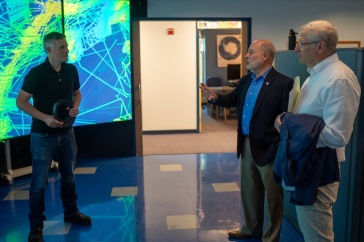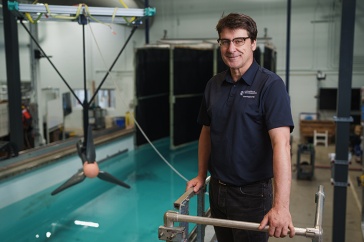
Four CEPS seniors are laying the groundwork for a sustainable aquaponic system in a community in Costa Rica.
Four engineering seniors recently laid the groundwork for a sustainable aquaponics system expected to produce fresh vegetables and fish for a community in Costa Rica, and Project Oasis members Siddharth Nigam, Paige Balcom, Will Tavares and Allison Wood hope the system they designed in the classroom will serve as a model for communities across the globe.
“This design can be used to produce food more efficiently than traditional growing methods,” says Nigam, who spent a week in Uvita, Costa Rica, with his classmates during winter break. “It’s especially useful in land- or water-scarce urban environments and in rural communities without the means to produce or access food.”
Aquaponic systems combine the growing of fish and plants without soil. Currently, systems are either expensive or smaller, do-it-yourself designs. The group is applying engineering principles they learned at UNH to make the system more affordable and sustainable. In Uvita, vegetables are too expensive for local residents to buy, and the soil is too poor to grow food.

“Our family-sized aquaponic systems will hopefully help the locals get a reliable and sustainable source of vegetables,” Nigam explains. “Additionally, it will give them a source of protein from tilapia.”
During their initial visit, students took measurements to determine the size and shape of the system and explored the viability of energy and water sources. This included taking multiple water samples for testing. Nigam, Balcom and Tavares are mechanical engineers, and Wood is an environmental engineer.
From their observations, they formed an action plan for a return trip in June to begin implementation of the system. The group also coordinated with Forjando Alas, a local afterschool program for at-risk children of the Bahía Ballena community in Uvita. The program provides a safe space for kids to learn life skills and gain enrichment through art and environmental education.
Balcom found the time spent with students in the village very rewarding.
“I loved meeting the people, especially the kids at Forjando Alas,” she says. “Everyone was so friendly, welcoming and excited about the project.”
Balcom recalls an 11-year-old boy telling her that he loved eating tomatoes. She told him that he would be able to grow his own tomatoes and eat them fresh off the plant.
“His face lit up in a huge smile,” she says. “It was really rewarding to see how we can apply our engineering knowledge to make a difference in people’s lives.”

Meet the Project Oasis team at the Interdisciplinary Science and Engineering Symposium on April 20, 2016, 1:30 – 4:30 p.m. at the Whittemore Center Arena.
Part of the funding for the project was provided through Project Oasis’s third-place finish in the student category at the UNH Social Venture Innovation Challenge, with additional funding from the UNH ocean engineering program, a grant from the Emeriti Council and a class project.
The idea for the project originated during the students’ freshman year, and they later connected with Forjando Alas.
“We wanted to do our senior design project on something that would impact developing nations,” Nigam says. “Learning to navigate a new culture while following a constrained timeline provided challenges, but they were worthwhile experiences as well.”
Nigam said more than a dozen UNH juniors are interested in continuing the project during the following school year to ensure its long-term viability.
Project Oasis is collaborating with the College of Life Sciences and Agriculture (COLSA) and the New Hampshire Agricultural Experiment Station (NHAES). The students are receiving mentorship from COLSA faculty members Todd Guerdat and Andrew Ogden, and constructing their aquaponics project in the NHAES’s Macfarlane Research Greenhouses.
-
Written By:
Brooks Payette | College of Engineering and Physical Sciences



















































